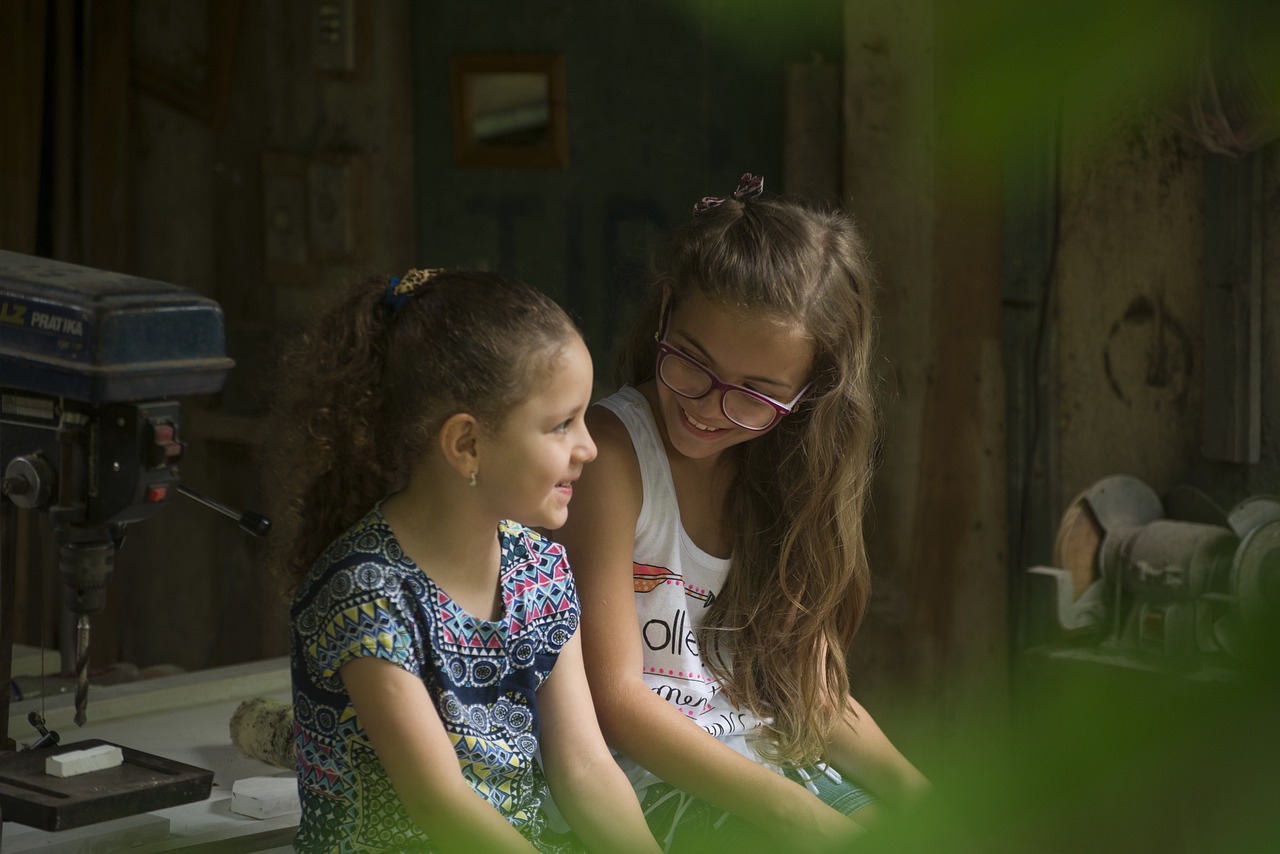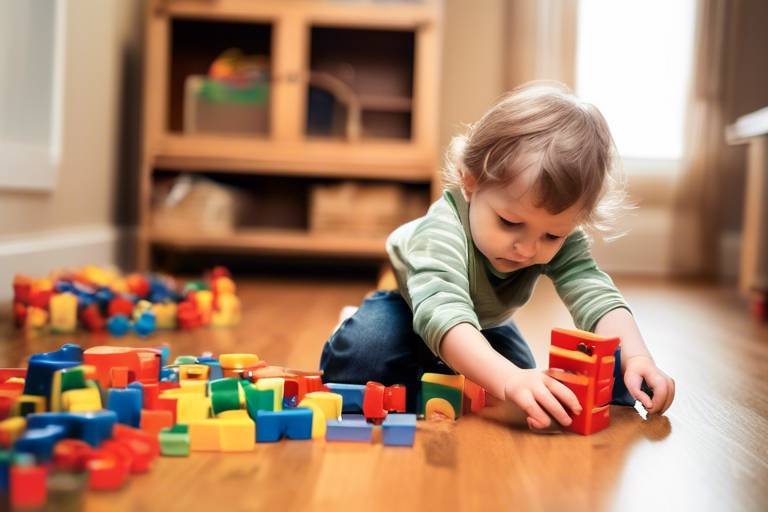Understanding the Link Between Play and Behavior
Play is more than just a pastime; it is a fundamental aspect of both childhood and adulthood that shapes our behaviors and interactions. When we think about play, we often envision children at play, but the truth is that play is a lifelong activity that influences our psychological and emotional well-being at every stage of life. It serves as a vital tool for learning, socialization, and even stress relief. Have you ever noticed how a simple game can lighten the mood in a tense situation? That's the magic of play!
At its core, play is an expression of freedom and creativity, allowing individuals to explore their surroundings, test boundaries, and develop skills. For children, engaging in various types of play is essential for cognitive growth. It fosters creativity, enhances problem-solving skills, and builds emotional resilience. Imagine a child constructing a tower of blocks; through this seemingly simple act, they learn about balance, cause and effect, and even patience as they rebuild after a collapse. This is just one example of how play lays the groundwork for critical life skills.
As we delve deeper into the psychology of play, we uncover its profound impact on social development. Through play, children learn how to navigate relationships, understand social cues, and develop empathy. It’s fascinating to see how a child pretending to be a doctor or a superhero is not just having fun; they are also practicing roles that enhance their understanding of the world and their place within it. This imaginative play is a cornerstone of their social development, allowing them to step into someone else's shoes and view situations from different perspectives.
But what about adults? Play is not just for kids! Adults also benefit immensely from engaging in playful activities. Whether it's participating in team sports, playing board games with friends, or even incorporating humor into the workplace, play can enhance creativity and reduce stress. Have you ever noticed how a light-hearted moment can break the ice during a serious meeting? That’s the power of play in fostering collaboration and innovation.
Despite its importance, play is often sidelined in our fast-paced modern society. The pressures of work, technology, and structured schedules can limit opportunities for play. This is a concerning trend, as play is essential for maintaining mental health and building strong social connections. By recognizing and overcoming these barriers, we can promote a culture that values play as a vital component of healthy behavior for all ages.
In summary, the link between play and behavior is undeniable. It shapes our experiences, influences our relationships, and contributes to our overall well-being. Whether we are children learning to interact with the world or adults seeking to foster connections and creativity, play remains a crucial element in our lives. So, let’s embrace play in all its forms and recognize its power to enrich our behavior and interactions!
- What types of play are most beneficial for children? Imaginative, physical, and constructive play are all essential for various aspects of development.
- Can adults benefit from play? Absolutely! Play helps reduce stress, enhances creativity, and strengthens interpersonal relationships.
- How can we encourage more play in our daily lives? By setting aside time for leisure activities, incorporating playful elements into work, and prioritizing social interactions.
- What are the consequences of a lack of play? A lack of play can lead to increased stress, decreased creativity, and weakened social connections.

The Importance of Play in Child Development
Play is not just a pastime; it’s a fundamental part of childhood that shapes the very essence of who children become. Imagine a world where children are free to explore, create, and learn through play. This is not just a whimsical thought; it's a necessity for their cognitive, emotional, and social development. When children engage in play, they are not merely having fun; they are building the skills they need to navigate their environment and form relationships with their peers. Through play, they develop a sense of self, learn to express their feelings, and understand the dynamics of social interactions.
One of the most fascinating aspects of play is its ability to foster creativity. When children engage in imaginative scenarios, such as pretending to be superheroes or playing house, they stretch their minds and explore different perspectives. This type of play encourages them to think outside the box and develop problem-solving skills that are crucial in adulthood. Additionally, play serves as a safe space for children to experiment with emotions. They can experience joy, frustration, and even empathy without the real-world consequences, allowing them to process their feelings in a healthy way.
Moreover, play is a powerful tool for building emotional resilience. Children learn to cope with challenges and setbacks through play. For instance, when a child loses a game, they experience disappointment, but they also learn how to handle that feeling and try again. This resilience is vital as they face the inevitable ups and downs of life. The ability to bounce back from setbacks is a skill that will carry them through their educational journey and into adulthood.
Social development is another critical area where play makes a significant impact. Through cooperative play, children learn the importance of teamwork and communication. They discover how to share, negotiate, and resolve conflicts, skills that are essential for building lasting relationships. For example, when children play a game together, they must take turns and respect each other's ideas, which fosters a sense of community and belonging. This social interaction is crucial for their overall well-being and helps them develop a strong sense of identity.
In summary, the importance of play in child development cannot be overstated. It is a multifaceted experience that nurtures creativity, emotional resilience, and social skills. As adults, we must recognize the value of play and ensure that children have ample opportunities to engage in it. By doing so, we are not just allowing them to have fun; we are equipping them with the tools they need to thrive in a complex world.

Types of Play and Their Impact
Play is not a one-size-fits-all experience; it comes in various forms, each offering its unique benefits and impacts on behavior. Understanding these different types of play is essential for parents, educators, and anyone interested in child development. Whether it’s imaginative, constructive, or physical play, each type plays a crucial role in shaping how children interact with the world around them. The beauty of play lies in its diversity, akin to a buffet where every dish offers something special to savor.
Firstly, let’s delve into imaginative play. This type of play is like a magical portal that transports children into different worlds, allowing them to explore various roles and scenarios. During imaginative play, children often engage in storytelling, dress-up, or role-playing, which enhances their creativity and social skills. For instance, when a child pretends to be a doctor, they not only learn about empathy by caring for their "patients" but also practice communication skills as they navigate these social interactions. It’s fascinating how a simple cardboard box can become a spaceship, encouraging children to think outside the box—literally!
Another significant type of play is constructive play, where children build and create. This could involve anything from stacking blocks to crafting intricate models. Constructive play is instrumental in developing problem-solving skills as children figure out how to make their structures stable or how to fit pieces together. It’s like a mini engineering project that fosters critical thinking. Imagine a child trying to build a tower; through trial and error, they learn about balance, gravity, and perseverance. This hands-on experience not only boosts their cognitive abilities but also enhances their fine motor skills.
Next, we have physical play, which encompasses activities like running, jumping, and sports. It’s not just about getting the wiggles out; physical play is vital for promoting health and teamwork. When children engage in sports or outdoor activities, they learn about cooperation, competition, and discipline. For example, playing soccer teaches them how to work as a team toward a common goal while also understanding the spirit of competition. Physical play is like a breath of fresh air, invigorating not just their bodies but also their social interactions. It teaches them valuable lessons about winning gracefully and losing with dignity, shaping their behavior in both social and academic settings.
Interestingly, the impact of play extends beyond childhood. The skills and behaviors developed through these various types of play can influence adult behavior as well. Adults who engaged in imaginative play as children may find it easier to think creatively in their jobs, while those who participated in team sports may excel in collaborative environments. It’s a ripple effect that showcases the lasting importance of play throughout our lives.
To summarize, the types of play—imaginative, constructive, and physical—each contribute significantly to a child's development and behavior. They are not merely activities to pass the time; they are essential tools that help shape how children perceive and interact with the world. Just as every ingredient in a recipe contributes to the final dish, each type of play enriches a child's development in unique and profound ways.
- What is imaginative play? Imaginative play involves children creating scenarios and roles, which enhances creativity and social skills.
- How does constructive play benefit children? Constructive play helps develop problem-solving skills and fine motor abilities as children build and create.
- Why is physical play important? Physical play promotes health, teamwork, and teaches children about cooperation and competition.
- Can adult behavior be influenced by play? Yes, the skills learned through play in childhood can positively affect creativity and collaboration in adulthood.
Imaginative Play
Imaginative play is like a magical gateway where children can step into a world of endless possibilities. It allows them to don various hats—be it a brave knight, a daring astronaut, or a nurturing parent—transforming their everyday surroundings into extraordinary realms. Through this type of play, children are not just passing time; they are actively engaging in a process that enhances their creativity and social skills. Imagine a child in a cardboard box, pretending it's a spaceship soaring through the galaxy. In that moment, they are not only exploring the universe but also learning to navigate complex social dynamics, such as teamwork and negotiation.
During imaginative play, children engage in role-playing, which provides invaluable opportunities to practice social interactions in a safe and controlled environment. As they take on different roles, they experiment with various communication styles and responses, honing their ability to express themselves clearly and effectively. This practice is crucial because it helps them understand social norms and expectations, which are essential for building future relationships. Think of it as a rehearsal for the grand play of life, where each child learns their lines and cues through trial and error.
Moreover, imaginative play serves as a canvas for emotional expression. When children create stories and scenarios, they often reflect their own feelings and experiences. This creative outlet allows them to process emotions that they might not yet have the words to articulate. For instance, a child might enact a scene where they are lost in a forest, mirroring a recent experience of feeling alone or scared. By acting it out, they can confront those feelings in a safe space, contributing to their emotional intelligence and resilience.
To illustrate the multifaceted benefits of imaginative play, consider the following table that outlines its key impacts:
| Benefit | Description |
|---|---|
| Creativity | Encourages children to think outside the box and develop innovative ideas. |
| Social Skills | Enhances communication and understanding of social interactions. |
| Emotional Intelligence | Helps children process their emotions and develop empathy. |
| Problem-Solving | Fosters critical thinking as children navigate challenges in their play scenarios. |
In conclusion, imaginative play is not merely a pastime; it is a vital component of child development that shapes behavior in profound ways. It equips children with the tools they need to understand themselves and the world around them. As parents and caregivers, encouraging this type of play can lead to more emotionally intelligent, socially adept, and creatively inspired individuals. So, the next time you see a child lost in their imagination, remember that they are not just playing—they are learning how to be a part of this complex world.
- What is imaginative play?
Imaginative play is a form of play where children create scenarios and roles, allowing them to explore different aspects of life and develop various skills. - How does imaginative play benefit children?
It enhances creativity, social skills, emotional intelligence, and problem-solving abilities. - At what age does imaginative play typically begin?
Imaginative play usually begins around the age of 2 and can continue well into childhood. - How can parents encourage imaginative play?
Parents can provide open-ended toys, create a safe play environment, and participate in play with their children to foster creativity.
Role-Playing and Social Skills
Role-playing is like a magical doorway that opens up a world of possibilities for children. When kids engage in role-playing, they step into the shoes of different characters, whether it's a superhero, a doctor, or even a family member. This immersive experience not only sparks their imagination but also plays a crucial role in developing essential social skills. By acting out various scenarios, children learn to navigate complex social interactions, which is an invaluable skill as they grow up.
One of the most significant benefits of role-playing is that it provides a safe space for children to practice communication. Imagine a child pretending to be a teacher, giving instructions to their classmates. In that moment, they are not just playing; they are honing their ability to convey ideas clearly and effectively. This practice can lead to improved verbal skills and greater confidence when speaking in front of others. Plus, it teaches them to listen actively, an essential component of effective communication.
Moreover, role-playing encourages children to develop empathy. When they take on different roles, they begin to understand perspectives that differ from their own. For instance, a child playing the role of a doctor may learn about compassion and care as they pretend to help a sick friend. This ability to empathize not only enhances their social interactions but also fosters a sense of community and cooperation among peers.
To illustrate the impact of role-playing on social skills, consider the following table that outlines some key benefits:
| Benefit | Description |
|---|---|
| Communication Skills | Enhances verbal and non-verbal communication through practice. |
| Empathy Development | Encourages understanding of different perspectives and feelings. |
| Conflict Resolution | Teaches children how to handle disagreements and find solutions. |
| Social Norms | Helps children learn appropriate social behaviors and interactions. |
In addition to these benefits, role-playing also fosters creativity. Children are encouraged to think outside the box, come up with unique scenarios, and invent dialogue. This creative expression not only enriches their playtime but also translates into better problem-solving skills in real-life situations. Just like a musician learns to improvise, children learn to adapt and innovate through role-playing.
In conclusion, role-playing serves as a vital tool in developing social skills among children. By stepping into different roles, they not only learn how to communicate effectively but also cultivate empathy and creativity. The beauty of role-playing lies in its ability to prepare children for the complexities of social interactions in the real world, making it an essential component of their development.
Creative Expression Through Imagination
Imaginative play is a magical gateway for children, allowing them to dive headfirst into a world where anything is possible. This form of play is not just about having fun; it serves as a vital outlet for creative expression. When children engage in imaginative scenarios, they are not only entertaining themselves but also exploring their thoughts and feelings in a safe and constructive way. Imagine a child pretending to be a superhero, flying through the sky and saving the day. In this moment, they are not just playing; they are processing emotions, learning about bravery, and understanding what it means to help others.
Through imaginative play, children can express their inner worlds. They are given the freedom to experiment with different identities and situations, which can lead to a deeper understanding of themselves and their relationships with others. This form of expression is crucial for developing emotional intelligence, as it allows children to navigate complex feelings and social dynamics. For instance, when a child pretends to be a doctor, they may confront fears related to health or illness, helping them cope with real-life situations in a more manageable way.
Moreover, imaginative play encourages children to engage in storytelling, which is a fundamental aspect of human communication. As they create narratives, they learn to structure their thoughts, articulate their ideas, and convey emotions effectively. This not only enhances their verbal skills but also boosts their confidence in social interactions. The ability to share a story or engage others in a playful scenario can strengthen bonds with peers, fostering a sense of community and belonging.
In addition, imaginative play can serve as a bridge to learning. For example, when children role-play as teachers or scientists, they often incorporate knowledge from their experiences in school. This integration of learning and play reinforces concepts in a fun and engaging way, making education feel less like a chore and more like an adventure. The creativity sparked during these sessions can lead to a lifelong love of learning, as children begin to associate knowledge with joy and exploration.
In conclusion, the role of creative expression through imagination in play is profound and multifaceted. It nurtures emotional and social development, enhances communication skills, and fosters a love for learning. As we encourage children to embrace their imaginative sides, we are not just allowing them to play; we are equipping them with essential tools for navigating the complexities of life.
- What is imaginative play? Imaginative play involves children creating scenarios where they can explore different roles and situations, enhancing their creativity and social skills.
- How does imaginative play benefit emotional development? It allows children to express their feelings creatively, helping them process experiences and develop emotional intelligence.
- Can imaginative play aid in learning? Yes, when children engage in role-playing, they often incorporate educational concepts, making learning more enjoyable and effective.
- What types of imaginative play are most beneficial? Role-playing, storytelling, and creative games are all excellent forms of imaginative play that contribute to various developmental areas.
Physical Play
Physical play is a vital component of development that extends far beyond just having fun. It encompasses a variety of activities, including sports, games, and outdoor adventures, which not only keep children active but also play a significant role in their overall growth. Engaging in physical play helps children develop motor skills, coordination, and strength, laying the groundwork for a healthy lifestyle. Imagine a child running freely in a park, their laughter ringing out as they chase friends; this scene is not just about play—it's about building a foundation for future physical competence and confidence.
Moreover, physical play teaches essential life skills. Through team sports, for instance, children learn about cooperation and teamwork. They understand how to work together towards a common goal, which is crucial not only in sports but also in everyday interactions. The lessons learned on the playing field often translate to better social skills and enhanced relationships with peers. When children engage in group activities, they develop a sense of belonging and community, which can significantly impact their emotional well-being.
Another fascinating aspect of physical play is its influence on behavior in both social and academic settings. Children who regularly participate in physical activities are often more focused and better at managing stress. This is partly due to the endorphins released during exercise, which enhance mood and reduce anxiety. For instance, a child who plays soccer might find that their ability to concentrate in class improves after a fun, energetic practice. This connection between physical activity and cognitive function highlights the importance of integrating physical play into daily routines.
Additionally, physical play can take many forms, catering to different interests and abilities. From organized sports to simple games like tag or hide-and-seek, the options are virtually endless. Here are some common types of physical play:
- Team Sports: Soccer, basketball, and baseball promote cooperation and strategic thinking.
- Outdoor Activities: Hiking, biking, and swimming encourage exploration and adventure.
- Creative Movement: Dance and gymnastics foster self-expression and body awareness.
In summary, physical play is not just a way to pass the time; it is a crucial element in developing a child’s social skills, emotional resilience, and physical health. As parents and educators, it is essential to encourage and facilitate opportunities for children to engage in various forms of physical play. By doing so, we help pave the way for a healthier, happier generation.
- Why is physical play important for children?
Physical play is essential for developing motor skills, social skills, and emotional resilience. It also promotes a healthy lifestyle and reduces stress. - What types of physical play can children engage in?
Children can participate in team sports, outdoor activities, and creative movement, among others. - How does physical play impact academic performance?
Engaging in physical activities can improve focus and cognitive function, leading to better academic performance.

The Role of Play in Adult Behavior
Play is not just a childhood pastime; it is a vital component of adult life that can significantly influence behavior, creativity, and interpersonal relationships. When we think of play, we often picture children laughing and running around, but adults can also benefit immensely from engaging in playful activities. Whether it's a casual game of soccer with friends, a board game night, or even playful banter at work, these experiences can enhance our quality of life in numerous ways.
One of the most compelling aspects of play in adulthood is its ability to foster creativity. Engaging in playful activities allows adults to step outside their daily routines and think outside the box. Just like children who use their imagination to create new worlds, adults can tap into their creative potential through play. This can lead to innovative solutions in both personal and professional settings. For instance, brainstorming sessions that incorporate playfulness often yield more creative ideas compared to traditional meetings. The relaxed atmosphere encourages participants to express themselves freely, leading to breakthroughs that might not occur in a more formal setting.
Moreover, play serves as an excellent stress reliever. In our fast-paced lives, adults often find themselves overwhelmed with responsibilities, whether at work or at home. Engaging in playful activities can provide a much-needed escape from the daily grind. When we play, our bodies release endorphins, the "feel-good" hormones that can help reduce stress and improve our mood. This is why many adults turn to hobbies, sports, or even playful interactions with friends as a way to unwind and recharge. It’s like hitting the refresh button on our mental state, allowing us to approach challenges with a clearer mind.
Additionally, play can strengthen social bonds and improve interpersonal relationships. When adults engage in playful activities, they often find common ground with others, fostering a sense of community and belonging. Whether it’s participating in a team sport or hosting a game night, these experiences create shared memories that deepen connections. Playful interactions also help to break down barriers, allowing individuals to communicate more openly and honestly. This can lead to enhanced teamwork in professional settings, where collaboration is key to success.
However, it’s essential to recognize that not all adults engage in play regularly. Various factors, such as work commitments and societal expectations, can hinder the practice of play in adulthood. To encourage a more playful lifestyle, adults should actively seek opportunities to incorporate play into their daily routines. This could mean scheduling regular game nights with friends, joining a sports league, or even participating in playful team-building exercises at work. By prioritizing play, adults can reap the numerous benefits it offers, transforming their behavior and enhancing their overall well-being.
In conclusion, the role of play in adult behavior is multifaceted and impactful. From enhancing creativity and reducing stress to strengthening social connections, play is an essential ingredient for a fulfilling adult life. So, why not embrace your inner child? After all, life is too short to take everything so seriously. Make time for play, and watch how it transforms your behavior and relationships!
- Why is play important for adults? Play helps reduce stress, enhances creativity, and strengthens social bonds.
- How can adults incorporate play into their lives? Adults can engage in sports, board games, or playful activities with friends and family.
- Can play improve workplace productivity? Yes, incorporating playfulness in the workplace can boost morale and foster collaboration.
Workplace Playfulness
In today's fast-paced world, where deadlines loom and pressure mounts, the idea of playfulness in the workplace might seem counterintuitive. However, incorporating playful elements into a professional environment can be a game-changer. Imagine a workplace where creativity flows freely, laughter echoes in the halls, and innovation is not just encouraged but celebrated. This is not just a dream; it's a reality that many forward-thinking companies are embracing. By fostering a playful atmosphere, organizations can unlock a treasure trove of benefits that enhance both employee well-being and productivity.
So, what does workplace playfulness look like? It can range from casual dress days and team-building games to creative brainstorming sessions that encourage out-of-the-box thinking. The key is to create an environment where employees feel comfortable expressing themselves and taking risks without the fear of failure. This sense of safety allows for greater collaboration and can lead to innovative solutions that might not emerge in a more rigid setting.
One might wonder, how does playfulness actually impact productivity? Research indicates that when employees engage in playful activities, they experience a boost in morale and motivation. This can lead to increased job satisfaction, which in turn reduces turnover rates. A playful workplace encourages employees to connect on a personal level, fostering stronger relationships and a sense of community. When colleagues bond over shared laughter or fun activities, they are more likely to collaborate effectively on projects, leading to improved outcomes.
Furthermore, playful environments can stimulate creativity. When teams participate in light-hearted activities, they are more likely to think creatively and generate innovative ideas. For instance, a company might implement a weekly "innovation hour" where employees can step away from their usual tasks to brainstorm new concepts in a relaxed setting. This not only breaks the monotony of the workday but also encourages a culture of continuous improvement.
To illustrate the impact of workplace playfulness, consider the following table that summarizes key benefits:
| Benefit | Description |
|---|---|
| Enhanced Creativity | Playful environments encourage out-of-the-box thinking, leading to innovative solutions. |
| Improved Morale | Engaging in playful activities boosts employee happiness and satisfaction. |
| Stronger Relationships | Play fosters connections among colleagues, enhancing teamwork and collaboration. |
| Reduced Stress | Playful activities can alleviate stress, contributing to better mental health. |
| Increased Productivity | Happy employees are more engaged and motivated, leading to higher productivity levels. |
In conclusion, embracing playfulness in the workplace is not merely a whimsical idea; it is a strategic approach to enhancing the overall work environment. By prioritizing a culture of play, organizations can cultivate a workforce that is not only more productive but also happier and more connected. So, why not take a moment to inject some fun into your workday? Whether it's through a quick game, a light-hearted competition, or simply encouraging laughter among colleagues, the benefits can be profound and far-reaching.
- What are some examples of playful activities in the workplace? Activities can include team-building games, themed dress days, or creative brainstorming sessions.
- How does playfulness improve employee morale? Playful activities create a relaxed atmosphere, allowing employees to bond and feel valued, which boosts overall job satisfaction.
- Can playfulness really impact productivity? Yes, studies show that happier employees are more engaged and motivated, leading to increased productivity.
- Is workplace playfulness suitable for all types of businesses? While it may vary by industry, many businesses can benefit from incorporating playful elements tailored to their culture.
Social Play and Relationships
When we think about play, it's easy to associate it with children running around in a park or engaging in imaginative games. However, social play is equally vital for adults, serving as a cornerstone for building and maintaining relationships. Just like children learn to interact with their peers through games, adults also benefit from playful interactions that strengthen their bonds. Engaging in playful activities fosters a sense of camaraderie and connection, making relationships more enjoyable and fulfilling.
Consider the last time you shared a laugh with friends over a board game or participated in a friendly sports match. These moments of social play create memories that deepen relationships and enhance emotional connections. When adults engage in playful activities, they often let their guards down, allowing for genuine interactions that might not occur in more serious settings. This playful atmosphere is crucial for cultivating trust and understanding among friends, family, and colleagues.
Moreover, social play is not just about having fun; it also serves important psychological functions. It can reduce stress, alleviate anxiety, and even improve mental health. When adults engage in playful interactions, they release endorphins, the body's natural feel-good chemicals, which can lead to improved mood and overall well-being. This is especially important in today’s fast-paced world, where stressors can take a toll on mental health. By incorporating play into their lives, adults can create a much-needed balance between work and relaxation.
In addition to enhancing existing relationships, social play can also facilitate the formation of new connections. Whether through team sports, community events, or social clubs, engaging in shared playful experiences can break down barriers and foster new friendships. These interactions often lead to stronger networks of support, which are essential for emotional resilience. In fact, many adults find that their closest friendships are formed through shared hobbies or activities that involve some element of play.
To sum it up, social play is a powerful tool for enhancing relationships among adults. It nurtures bonds, fosters emotional connections, and contributes to overall well-being. So, the next time you find yourself feeling stressed or disconnected, consider engaging in some form of play. Whether it's a game night with friends or a casual outing with family, these moments of joy and laughter can significantly enrich your social life.
- What is social play? Social play refers to playful interactions between individuals that foster connections and relationships. It can take many forms, such as games, sports, or other recreational activities.
- How does social play benefit adults? Engaging in social play can reduce stress, improve mood, strengthen relationships, and facilitate new friendships, all of which contribute to overall emotional well-being.
- Can social play improve teamwork in the workplace? Absolutely! Incorporating playful elements in the workplace can enhance collaboration, creativity, and productivity among team members.
- What types of activities can be considered social play? Social play can include board games, team sports, group outings, or even playful banter among friends. The key is that these activities involve interaction and enjoyment.

Challenges to Play in Modern Society
In today's fast-paced world, the significance of play often gets overshadowed by the myriad of responsibilities and distractions that occupy our daily lives. This is particularly evident in both children and adults, as the pressures of academic achievement, career advancement, and social obligations can significantly limit the time and space available for playful activities. One of the primary challenges is the increasing prevalence of digital entertainment. With screens dominating our attention, many individuals, especially younger generations, find themselves engrossed in video games, social media, and streaming services, often at the expense of traditional forms of play.
Moreover, the structured nature of modern education systems can stifle creativity and free play among children. Schools often prioritize standardized testing and academic performance, which can lead to a reduction in recess time and unstructured play opportunities. When children are confined to rigid schedules filled with lessons and assessments, they miss out on the spontaneous interactions and imaginative exploration that are crucial for their development. As a result, children may struggle to develop essential social skills and emotional resilience, which are typically nurtured through play.
Another significant hurdle is the safety concerns that many parents face today. In an era where awareness of potential dangers is heightened, parents may restrict their children's outdoor playtime, opting instead for supervised indoor activities. While safety is paramount, this can limit children's opportunities to engage in physical play, which is vital for their health and social development. Furthermore, urbanization has led to a decrease in accessible play spaces. Many neighborhoods lack parks or playgrounds, making it challenging for families to find safe environments where children can engage in free play.
Even in adulthood, the challenges persist. The demands of work and family life can leave little room for leisure activities. Adults often prioritize responsibilities over relaxation, leading to a culture where play is viewed as a luxury rather than a necessity. This mindset can result in increased stress and decreased overall well-being. To combat these challenges, it's essential to advocate for the integration of play into daily routines, both for children and adults. Simple changes, such as scheduling regular family game nights or encouraging outdoor activities, can make a significant difference in enhancing the quality of life.
In summary, while the importance of play is universally acknowledged, various societal factors hinder its practice. By recognizing these challenges, we can work towards creating environments that promote play as a vital component of healthy behavior across all age groups. This involves not only advocating for more play opportunities in schools and communities but also fostering a culture that values leisure and creativity in our everyday lives.
- Why is play important for adults? Play helps reduce stress, enhances creativity, and strengthens interpersonal relationships, contributing to overall well-being.
- How can I encourage my child to play more? Create a safe and stimulating environment, limit screen time, and provide various toys and materials that inspire imaginative play.
- What are some examples of physical play for children? Activities like sports, tag, climbing, and dancing are excellent forms of physical play that promote health and social skills.
- How can workplaces incorporate play? Organizing team-building activities, creating relaxation spaces, and encouraging breaks for playful interactions can enhance workplace morale.
Frequently Asked Questions
- What role does play have in child development?
Play is essential for children's development as it enhances their cognitive, emotional, and social skills. Through play, children learn to solve problems, express their feelings, and interact with peers, which helps them build resilience and creativity.
- How does imaginative play benefit children?
Imaginative play allows children to explore different roles and scenarios, fostering creativity and social skills. It promotes empathy as they learn to navigate various social situations, which is crucial for their emotional development.
- What are the benefits of physical play?
Physical play, such as sports and outdoor activities, encourages physical health and teamwork. It teaches children about cooperation, competition, and discipline, positively influencing their behavior in both social and academic environments.
- Can adults benefit from play?
Absolutely! Play is just as important for adults. Engaging in playful activities can boost creativity, reduce stress, and improve interpersonal relationships, making life more enjoyable and fulfilling.
- How can play improve workplace dynamics?
Incorporating play into the workplace can significantly enhance morale and productivity. A playful environment fosters collaboration and innovation, leading to a more dynamic and effective team.
- What challenges does modern society face regarding play?
Despite its importance, various societal factors, such as technology and busy lifestyles, hinder the practice of play. Recognizing these challenges is crucial to promoting play as a vital part of healthy behavior across all age groups.



















